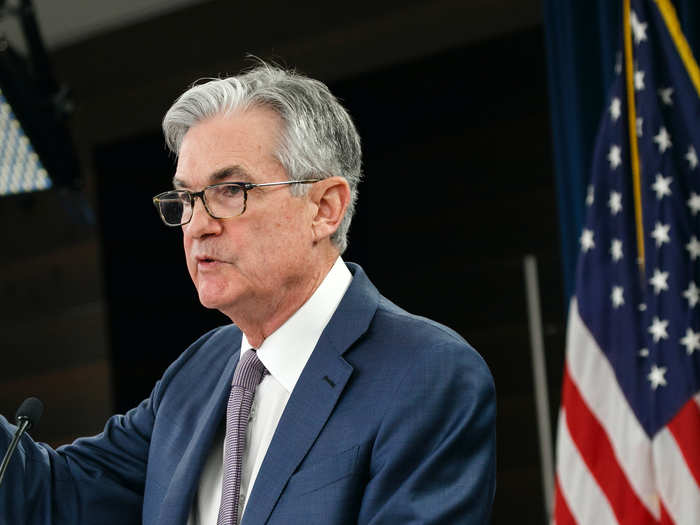
The Federal Reserve was among the first major central banks to slash its benchmark rate and ease lending conditions when the virus began to spread outside of China. The interest rate sits near zero for the first time since 2008 after two emergency rate cuts, encouraging banks to borrow and add fresh capital to the financial system.
Saudi Arabia, the UK, Canada, South Korea, South Africa, and Australia, among other nations, have also slashed their interest rates to new lows in recent weeks. Such actions are viewed as a first-response mechanism to keep economic activity strong.
However, the effect of rates falling below zero is still debated among economists, limiting the extent to which central banks will lower their rates.

US markets tanked through early March as investors waited for the White House to meet the Fed's monetary policy with a comprehensive fiscal policy plan.
Since then, the Trump administration has revealed plans to send Americans checks, issue loans to distressed industries, and boost programs for families hit hardest by the outbreak. The package is set to release $1.3 trillion to affected businesses and Americans.
Italy, the country currently suffering the most from the outbreak, approved a wide-reaching, 25-billion euro stimulus measure on Wednesday. The package calls for the nationalization of bankrupt airline Alitalia, partially funded sick leave for parents, funding for babysitters, payments for health sector hiring, and financial support for small businesses.
Canada, Russia, and Australia have also enacted stimulus plans aimed at providing relief for ailing sectors and citizens. Other countries are in the process of forming their own measures, leaving room for the worldwide stimulus total to swell as the outbreak intensifies.

President Trump pushed the deadline to file US taxes to July 15 from April 15 on Thursday, giving Americans more time to assess their finances and shore up cash for any outstanding payments.
France issued a similar policy for its businesses, allowing them to postpone tax payments as credit lines dry up and revenue flows slow. Firms and employees in Russia's tourism sector — an industry hit particularly hard by the virus — will also be able to delay tax payments.

The chaotic sell-offs taking place across global stock markets fueled mass retreats from risk assets over the past month, cutting companies off from once-reliable credit lines. The shock to corporate debt markets could quickly lead unprepared firms to bankruptcy, and nations have quickly responded by trying to calm markets.
Italy, France, Spain, Belgium, Greece, and South Korea have all issued temporary short-selling bans while the government looks to stabilize firms' valuations.
The European Union's financial regulator, the European Securities and Markets Authority, also called for greater transparency for investors' short positions as the outbreak escalates.
"ESMA considers that the current circumstances constitute a serious threat to market confidence in the EU, and that the proposed measure is appropriate and proportionate to address the current threat level to EU financial markets," the agency said in a statement.

Central banks around the world used capital injections early in their fight against the coronavirus to support liquidity in stressed money markets.
The Federal Reserve announced roughly $5 trillion worth of planned injections through market repurchase agreement, or repo, operations on March 12. Additional operations totaling $500 billion have been conducted on a day-by-day basis through the month.
The Fed also plans to buy at least $700 billion worth of bonds and mortgage-backed securities for additional easing. A recently announced commercial paper purchase facility will allow the bank to provide US businesses with funding for daily expenses such as rent and payroll.
The European Central Bank, People's Bank of China, Saudi Arabia have also pumped additional liquidity into their financial systems in recent weeks through repo operations and asset purchases.

Some countries have turned to business-specific tax cuts to keep firms above water as many are forced to shut their doors. UK Chancellor Rishi Sunak revealed 20 billion pounds worth of tax cuts and grants this week for the leisure, hospitality, and tourism industries that have faced a sudden stop in consumer demand amid the outbreak.
Turkey and China have also issued tax cuts for businesses struggling through the economic downturn.
Now read more markets coverage from Markets Insider and Business Insider:
 Stock markets stage strong rebound after 4 days of slump; Sensex rallies 599 pts
Stock markets stage strong rebound after 4 days of slump; Sensex rallies 599 pts
 Sustainable Transportation Alternatives
Sustainable Transportation Alternatives
 10 Foods you should avoid eating when in stress
10 Foods you should avoid eating when in stress

Copyright © 2024. Times Internet Limited. All rights reserved.For reprint rights. Times Syndication Service.